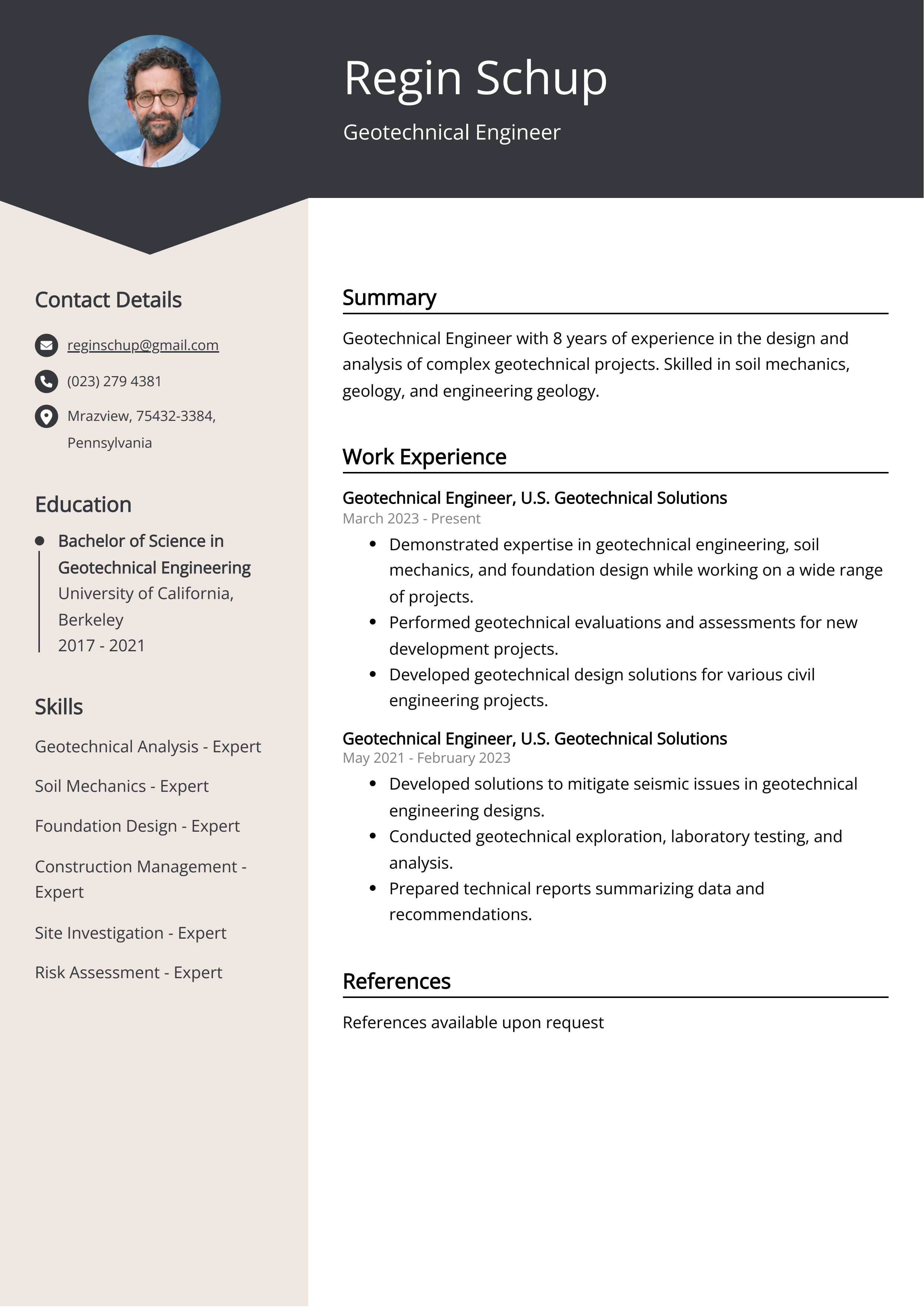The 6-Minute Rule for Geotheta
The 6-Minute Rule for Geotheta
Blog Article
The smart Trick of Geotheta That Nobody is Talking About
Table of ContentsGeotheta Can Be Fun For AnyoneGeotheta Fundamentals ExplainedGeotheta Things To Know Before You Get ThisHow Geotheta can Save You Time, Stress, and Money.The Only Guide to Geotheta

With experience and a tried and tested record, you can proceed to senior design duties, project monitoring positions, and even begin your own consultancy. Continual professional advancement and remaining up-to-date with the most recent sector patterns and technologies are crucial for profession development in this vibrant area. A profession in geotechnical design supplies a diverse variety of tasks and obstacles, ensuring that no two days coincide.
In the workplace, you will certainly analyze data, prepare reports, and work together with various other professionals - https://www.easel.ly/browserEasel/14498559. Fieldwork includes website check outs, accumulating soil samples, carrying out geotechnical investigations, and managing construction activities. Depending on the job, you might work on-site in differing weather and travel to various places within the UK. As a geotechnical designer, your jobs may consist of website characterization, slope stabilization layout, foundation engineering, dirt improvement methods, and geotechnical instrumentation and surveillance.
Geotheta - The Facts
You will also communicate with clients, specialists, and regulative authorities to attend to any type of worries and ensure compliance with industry standards and regulations. Geotechnical design can be tough, as it includes taking care of intricate dirt problems and attending to prospective dangers to human life and infrastructure. Nonetheless, efficiently fixing geotechnical issues and contributing to the development of secure and sustainable structures can be profoundly fulfilling.
If you're thinking about a profession in geotechnical design, right here are some valuable ideas to help you attain success: Networking is vital for profession advancement in any kind of area, and geotechnical engineering is no exemption. Joining specialist associations, such as the Establishment of Civil Engineers (ICE) and the British Geotechnical Association (BGA), can give networking possibilities, access to sector events and meetings, and important sources for expert development.

Establishing solid social and management skills will establish you apart and open doors to job advancement opportunities - https://gravatar.com/exactlypainterdeb7b76e1a. Beginning on a career as a geotechnical designer in the UK offers interesting leads and the chance to contribute to the development of the developed setting. By complying with the instructional pathways, acquiring essential licenses and certifications, and constantly sharpening your abilities, you can build a successful job in this dynamic area
An Unbiased View of Geotheta
When a person asks what I do and I inform them that I am a geotechnical engineer, I usually get the follow-up concern of, "What is that?" Geotechnical engineering is a specific branch of civil engineering that takes care of the scientific research of the auto mechanics of soil and rock and its applications.
In this article, I will discuss the role of geotechnical engineering and the sorts of problems geotechnical designers fix. Geotechnical designers (geotechs) are associated with almost every kind of civil engineering job. After all, every structure is sustained by dirt or rock unless it is floating, flying, or dropping.
Geotechs are generally most included at the start of a job. A few of the tasks that a geotech might be in charge of are exploring subsurface problems, identifying required laboratory screening of dirt and rock, translating the subsurface exploration results, and creating records that document the site conditions and provide referrals for structures, fill specs, slope security, etc.
Usually, individuals do not wish to spend for geotechnical records or layout on smaller sized tasks, however the expense of a specialist is typically much more affordable than spending for considerable structure repair services in the future. Geotechs are entailed in the design of freeway cuts and fills up, shallow and deep foundations, earth preserving frameworks, embankments, passages, garbage dumps, dams, incline stabilization systems, and pavement subgrades.
A Biased View of Geotheta

Often, points that may not appear important turn out to be vital years later when problems arise. Consulting Engineers. One last thing to maintain in mind: geotechnical engineering is married to geology. Despite just how excellent your engineering know-how is, if something essential is missed out on in the geologic characterization at a website, your knowledge might not conserve you
Vance, P.E., graduated from Marshall University with a Bachelor of Science in Design and obtained a Master of Science in Civil Engineering from the College of Illinois at Urbana-Champaign. He is presently pursuing a Ph. D. in Geological Engineering at Missouri University of Scientific Research and Technology. Jese works as a geotechnical engineer who concentrates on geohazards.
The Greatest Guide To Geotheta
Jese lives in West Virginia with his better half and boy. He appreciates creeping about on any type of landslide he can find and investing time fly angling on the water. I hope you enjoyed this week's message by guest writer Jese Vance.
Civil engineering is the specialist engineering self-control that deals with the layout, building and upkeep of public and personal infrastructure within the all-natural environment. Geotechnical design is a self-control within civil design that concentrates on the actions of natural geological products in engineered systems.
Report this page